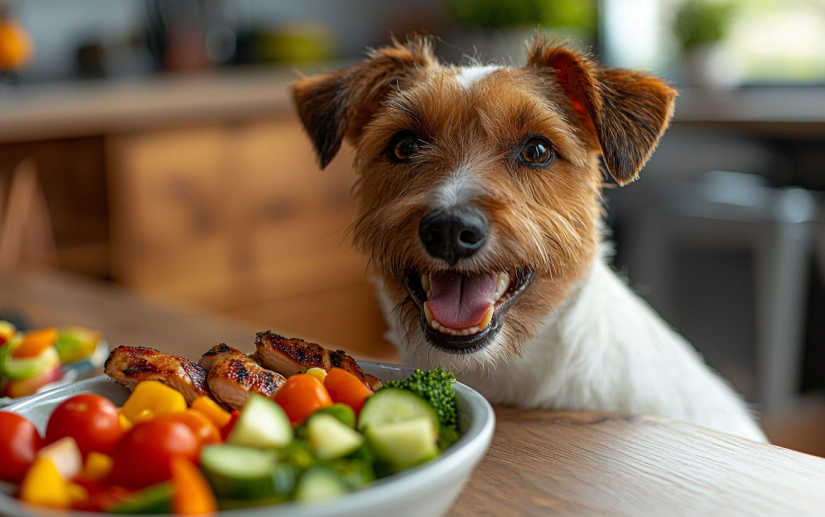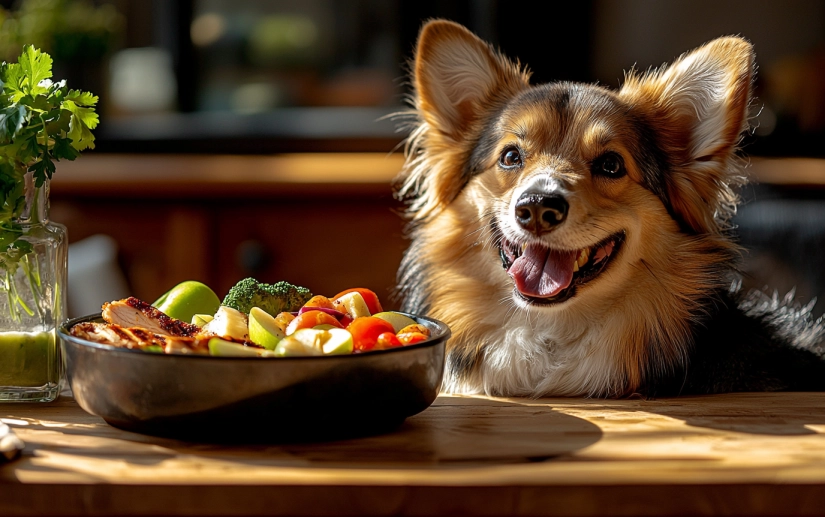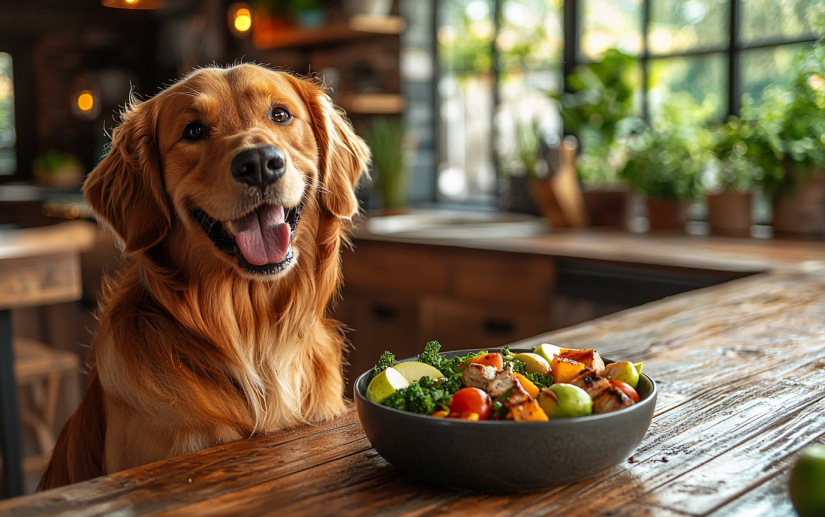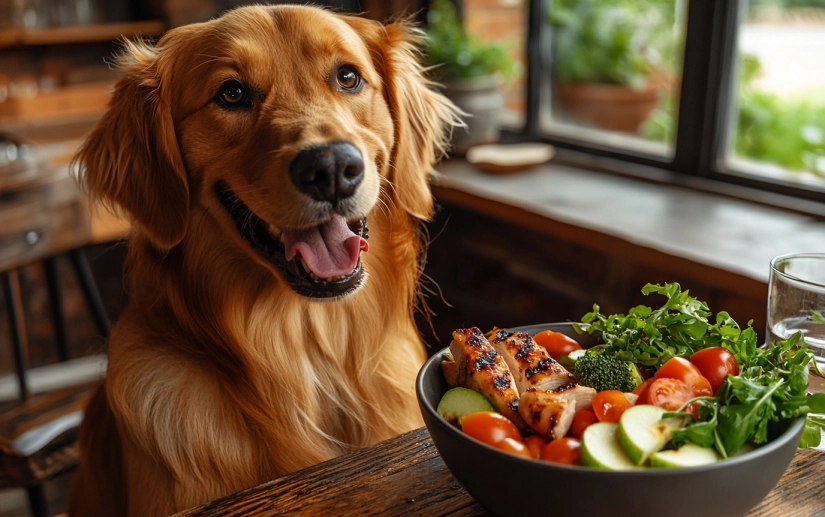Why Certain Human Foods Are Safe for Dogs
While dogs primarily thrive on a balanced diet of proteins, fats, and carbohydrates designed specifically for them, some human foods can be incorporated into their diet for added benefits. These foods often provide essential nutrients like fiber, vitamins, and antioxidants that help with digestion, boost immune function, improve skin and coat health, and support joint and muscle development.
It’s important to note, however, that moderation is key. Even healthy foods can cause upset stomachs or lead to weight gain if given in excess. Always introduce new foods gradually, monitor your dog’s reactions, and consult your veterinarian if you’re unsure about a particular food. With that in mind, let’s dive into the healthiest human foods you can safely share with your dog.
Top 15 Healthiest Human Foods That Dogs Can Safely Eat
1. Apples
Apples are a fantastic source of vitamins A and C, which help support healthy skin and coat, as well as immune function. They’re also packed with fiber, which aids in digestion and helps keep your dog’s bowel movements regular. However, be sure to remove the seeds and core, as apple seeds contain small amounts of cyanide, which can be harmful over time.
How to serve: Slice apples into small pieces and offer them as a crunchy snack. You can also blend apples into purees or freeze them for a refreshing treat on hot days.
2. Blueberries
Blueberries are a superfood loaded with antioxidants, which protect cells from damage caused by free radicals. They also provide fiber, vitamin C, and vitamin K, contributing to heart health and digestion. Studies suggest that blueberries may even improve cognitive function in older dogs, making them a great addition to their diet.
How to serve: Offer a small handful of fresh or frozen blueberries as a snack or mix them into your dog’s meals for added flavor and nutrition.
3. Carrots
Carrots are low in calories and high in fiber and beta-carotene, which converts into vitamin A in the body. Vitamin A promotes healthy vision, boosts the immune system, and supports skin health. The crunchy texture of carrots also helps clean your dog’s teeth, reducing the risk of plaque buildup.
How to serve: Offer raw baby carrots or cut regular carrots into small, manageable pieces. You can also steam or cook them to make them softer for dogs with sensitive teeth.
4. Pumpkin

Pumpkin is rich in fiber and beta-carotene, making it an excellent choice for improving digestion and promoting a healthy digestive system. It’s particularly helpful for dogs suffering from constipation or diarrhea, as it can regulate bowel movements. Pumpkin also contains essential vitamins such as vitamin A, vitamin E, and potassium.
How to serve: Use plain, canned pumpkin or cook fresh pumpkin. Add a spoonful to your dog’s regular food, or mix it into treats or baked goods.
5. Peanut Butter (Unsalted and Unsweetened)
Peanut butter is a favorite among dogs, and it’s not only delicious but also packed with protein, healthy fats, and vitamins B and E. These nutrients help support muscle development, a shiny coat, and a strong immune system. Make sure the peanut butter you choose is free from xylitol, an artificial sweetener that is toxic to dogs.
How to serve: Spread peanut butter inside toys, on biscuits, or offer it as a reward during training sessions. It can also be added to homemade dog treats.
6. Plain Cooked Chicken
Chicken is a lean source of protein that helps build and maintain muscle mass in dogs. It’s also packed with essential amino acids, which are crucial for tissue repair, as well as healthy skin and coat. Chicken is often recommended for dogs with sensitive stomachs due to its digestibility.
How to serve: Offer plain, boneless, skinless chicken breasts that are boiled or baked without seasoning. You can mix it with your dog’s regular food or serve it as a treat.
7. Plain Cooked Salmon
Salmon is rich in omega-3 fatty acids, which have numerous benefits for dogs, including promoting a healthy coat, reducing inflammation, and supporting brain health. These fatty acids are particularly helpful for dogs suffering from skin allergies or joint issues.
How to serve: Cooked salmon (baked or grilled) is best. Be sure to remove all bones and avoid seasoning. You can mix salmon into your dog’s regular food or offer it as a special treat.
8. Sweet Potatoes
Sweet potatoes are a powerhouse of nutrition, containing vitamins A, C, and B6, as well as fiber, which supports healthy digestion. They also provide antioxidants that help prevent oxidative damage to cells. Sweet potatoes are particularly beneficial for dogs with digestive issues or food sensitivities.
How to serve: Steam or bake sweet potatoes and cut them into small cubes. You can also mash them and mix them with your dog’s regular food.
9. Plain Yogurt (Unsweetened)
Yogurt is an excellent source of calcium and protein, which helps maintain strong bones and muscles in dogs. It also contains probiotics, which are beneficial bacteria that support gut health and improve digestion. Be sure to choose plain, unsweetened yogurt, as flavored varieties may contain sugars or artificial sweeteners.
How to serve: Offer a spoonful of yogurt as a topping on your dog’s food or mix it with fruits like blueberries or apples for a healthy snack.
10. Eggs (Cooked)
Eggs are a nutrient-dense food packed with protein, healthy fats, and essential vitamins and minerals. They’re also an excellent source of amino acids, which are vital for muscle repair and overall health. Cooked eggs are particularly beneficial for active dogs, providing them with a quick energy boost.
How to serve: Serve scrambled or hard-boiled eggs without seasoning. Avoid feeding raw eggs, as they may contain harmful bacteria like Salmonella.
11. Oatmeal

Oatmeal is a fantastic source of soluble fiber, making it an ideal option for dogs with digestive issues, particularly those suffering from irregular bowel movements. It’s also rich in vitamins and minerals such as manganese, which supports bone health and metabolic functions.
How to serve: Cook plain oatmeal with water (avoid using milk or adding sugar). Serve it as a warm meal or mix it into your dog’s regular food.
12. Green Beans
Green beans are a low-calorie vegetable packed with vitamins A, C, and K, as well as fiber, which promotes digestive health. They also contain a good amount of magnesium and iron, supporting energy production and overall well-being.
How to serve: Offer steamed or raw green beans as a snack, or mix them into your dog’s meals for extra crunch and nutrition.
13. Watermelon (Seedless)
Watermelon is a hydrating fruit packed with vitamins A, B6, and C. It’s also low in calories, making it a great snack for dogs, especially during the hot summer months. Watermelon’s high water content helps keep dogs hydrated, and its nutrients support heart health and immune function.
How to serve: Remove the seeds and rind, and offer small chunks of watermelon as a refreshing treat.
14. Spinach
Spinach is a leafy green vegetable loaded with iron, antioxidants, and vitamins A, C, and K. It promotes healthy vision, supports heart health, and provides anti-inflammatory benefits. However, it should be given in moderation due to its oxalate content, which can interfere with calcium absorption.
How to serve: Lightly steam or chop spinach and mix it into your dog’s meals.
15. Quinoa
Quinoa is a grain that’s high in protein, fiber, and essential amino acids. It’s a great alternative to traditional grains like rice and can help provide your dog with sustained energy, support muscle health, and improve digestion. Quinoa is also gluten-free, making it suitable for dogs with food sensitivities.
How to serve: Cook quinoa according to package instructions (without seasoning) and mix it with your dog’s regular food.
READ ALSO: Dog Food Storage 101: Keep Your Dog’s Food Fresh and Safe
How to Safely Incorporate Human Foods Into Your Dog’s Diet
When adding human foods to your dog’s diet, it’s important to follow a few key guidelines to ensure their safety and well-being:
- Moderation is Key: While the foods listed above are healthy, too much of a good thing can lead to digestive upset or weight gain. Offer small amounts of these foods as snacks or meal toppers, rather than full meals.
- Introduce New Foods Gradually: Start by offering a small amount of a new food and observe your dog’s reaction. If they tolerate it well, you can gradually increase the portion size.
- Consult Your Veterinarian: Before introducing any new food into your dog’s diet, especially if they have pre-existing health conditions or food sensitivities, it’s always best to consult your veterinarian for personalized advice.
- Avoid Seasonings and Additives: Human foods should be served plain, without added salt, sugar, spices, or oils. Many seasonings that are safe for humans can be harmful to dogs.
Foods to Avoid: Common Dangerous Human Foods for Dogs

While there are many healthy human foods that dogs can enjoy, there are also several that are toxic or harmful. Avoid feeding your dog the following foods:
- Chocolate
- Grapes and Raisins
- Onions and Garlic
- Avocados
- Macadamia Nuts
- Xylitol
These foods can cause serious health problems, including kidney failure, liver damage, and in some cases, death. Always double-check before offering any human food to your dog, and keep these harmful items out of reach.
Conclusion
Providing your dog with the right nutrition is essential for their health, happiness, and longevity. By incorporating these Top 15 Healthiest Human Foods That Dogs Can Safely Eat into their diet, you can offer variety while ensuring they receive valuable nutrients that support their overall well-being. Always remember to serve these foods in moderation, keep an eye on how your dog reacts, and consult your veterinarian when in doubt. With careful planning, you can give your furry friend a delicious and nutritious diet that enhances their life for years to come!





